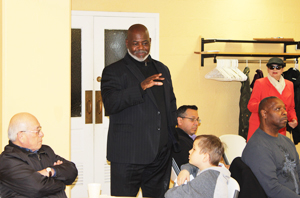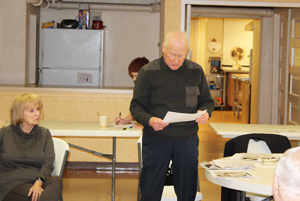
The Truth Staff
Several dozen members of the community gathered at Park Church on Saturday, March 25, to hear former Toledo mayors expound on their belief that the problems of gun violence in the city can be solved by utilizing the commonsense approach they have proposed and without the expensive interference of an outside group.
Former mayors Donna Owens, Mike Bell and Carty Finkbeiner, of the Coalition for Peaceful Toledo Neighborhoods, all spoke passionately about the 12-point proposal they have assembled after months of listening to the community while also railing against the city’s administration for the apparent unwillingness to meet with them and discuss the options.
“We got together because nothing was happening and people were getting shot,” said Owens. “We have not been welcomed by the administration but we have been welcomed by the people.
Owens spoke of some of the items on the 12-point list, particularly restoring block watch to its previous prominence in the city.
“Block watch is what people want … it’s not hard and there is money available. We want to help … we don’t want to accuse but get off your duffs and do something.”
Former mayor Bell emphasized the importance of the input the mayors’ group had received from the community.
“We are four taxpayers,” said Bell of the group of former mayors (former mayor Paula Hicks-Hudson is also part of the group, though not present on this particular day). “We are not talking for ourselves, we are talking about what people are saying.

“The 12 points are what citizens are saying. We four former mayors are taking our egos out of this. From multiple dimensions we are talking. But we’re done sitting here talking and talking and talking. We want a one-on-one with the mayor … we’ve been waiting too long for a report,” said Bell referring a report from Cities United, the firm the city will be hiring to tell the administration and city council how to reduce gun violence.
“That [report] looks like a waste of time and money,” he added.
Bell then told the attendees that the mayor’s group will be heading down to Columbus within the week to meet with the state safety director and the director of mental health.
Finkbeiner also expressed his frustration with what he sees is inaction on the part of the city administration and the proposed contract with the outside firm, Cities United.
“We will solve our problems in our city,” he told the attendees. “We shouldn’t be hiring them to come here to solve the problem.”
Cities United is a firm that was founded a dozen years ago to advise city administrations on solutions to gun violence. To date, the organization lists 130 cities that they have worked with and one of those cities, much to Finkbeiner’s chagrin, is Louisville, Kentucky, also the headquarters of the firm.
“Louisville, Kentucky has just been identified as the most messed up city in the United States,” said Finkbeiner referring to an announcement by the U.S. Department of Justice about the work that Louisville, particularly its police department, needs to do to clean up its many issues.
United States Attorney General Merrick Garland released a report earlier this month finding that the city and its police department have violated the constitutional rights of its citizens, particularly Black people.
The department, for years, “has practiced an aggressive style of policing that it deploys selectively, especially against Black people, but also against vulnerable people throughout the city. LMPD cites people for minor offenses, like wide turns and broken taillights, while serious crimes like sexual assault and homicide go unsolved,” said Garland.
Kristen Clarke, assistant attorney general for Civil Rights, added: “People in Louisville deserve constitutional policing. They deserve policing that is fair and non-discriminatory.”
She said, for instance, Louisville police selectively targeted Black people compared to their white counterparts.
“Our investigation found that the police department and city government failed to adequately protect and serve the people of Louisville, breached the public’s trust and discriminated against Black people through unjustified stop, searches and arrests,” she said.
Garland also announced Louisville has agreed “in principle” to forge a consent decree that will be enforced by a federal judge who will monitor the city’s progress in adopting reforms.
This weekend, Bell added one more criticism of the current city administration’s failure to move on a plan to curb violence. “What we are trying to do now,” he said referring to the administration, “is figure out what is perfect politics for moving forward, meanwhile … pop … pop … pop.”
The 12-point Coalition platform is comprised of the following points:
- Youth programming that provides access to mentorship, job training and educational opportunities;
- Neighborhood support and community building resources that foster positive relationships and build stronger, more cohesive communities;
- Increased police presence and involvement in neighborhoods, focused on community policing efforts that prioritize communications, trust and respect between law enforcement and residents;
- Our judicial, probation and parole system, while following the law, must apply stringent penalties to convicted offenders and limit the ability of repeat violent offenders to walk the streets while awaiting trial.
- Support for parents and parenting classes, including access to resources on conflict resolution and parenting techniques;
- Revitalization and cleanup of neighborhoods, including investment in infrastructure and beautification efforts that support community engagement and increase access to public spaces;
- Mental health resources that provide access to counseling, crisis intervention and other mental health services;
- Renewal and strengthening of Community Watch programs, including the expansion of programs and resources that facilitate communication and engagement between neighbors and law enforcement.
- Strengthening of gun laws, including the adoption of local policies and ordinances aimed at preventing gun violence and supporting responsible gun ownership;
- Safe methods of reporting crimes, including the development of anonymous reporting mechanisms and the adoption of policies that protect whistleblowers and other informants;
- Cameras in the neighborhoods, including the deployment of surveillance technologies that are subject to strict privacy protections and oversight mechanisms;
- Enforcement of curfews, including the adoption of clear, consistent policies on curfews for minors and the provision of resources and support for parents to ensure compliance.
